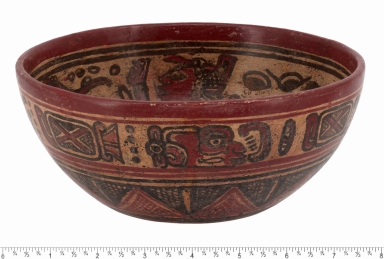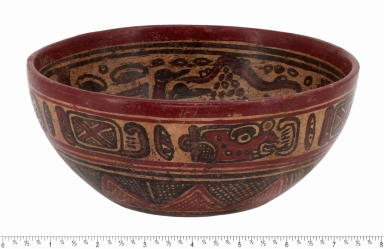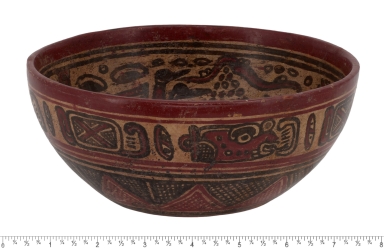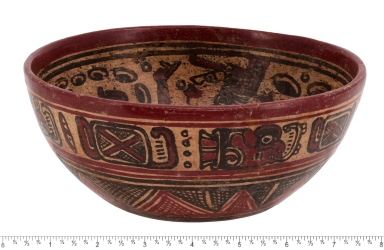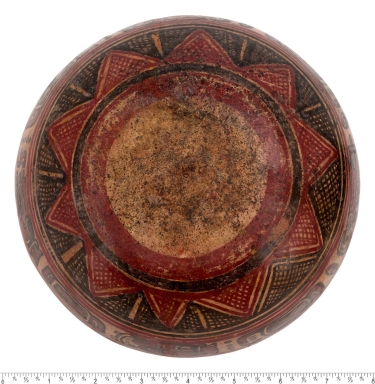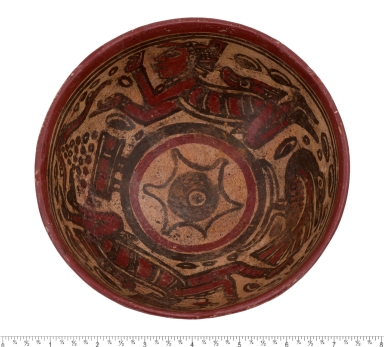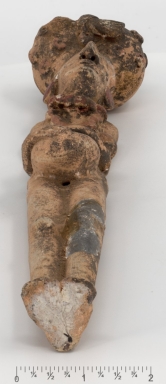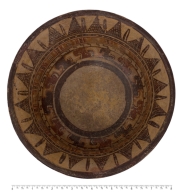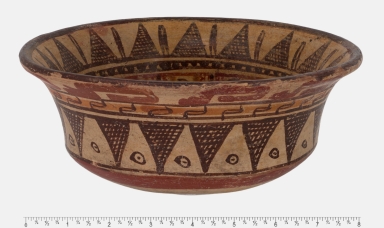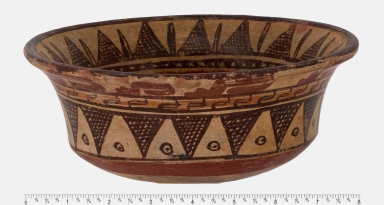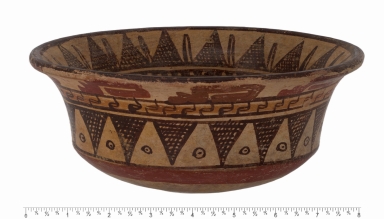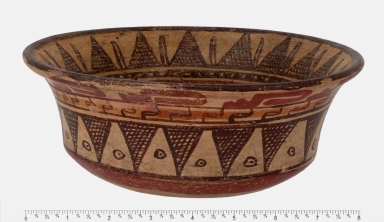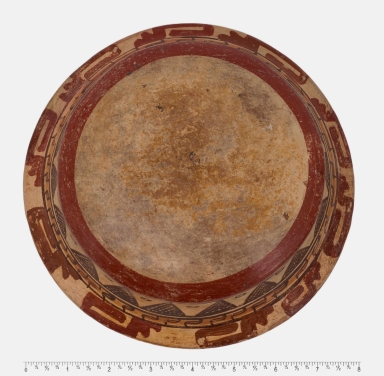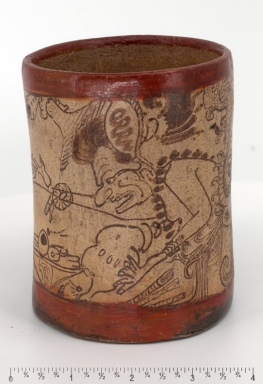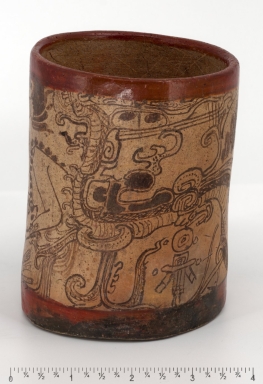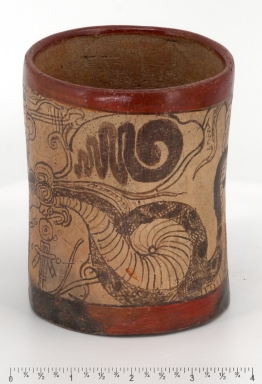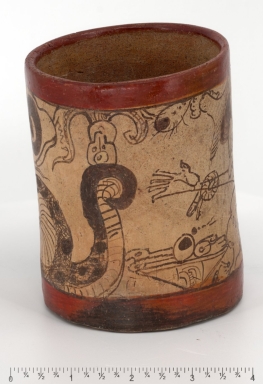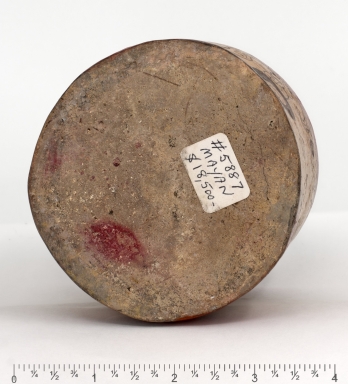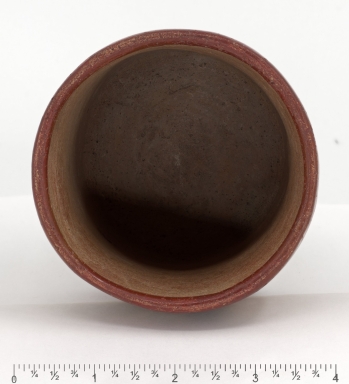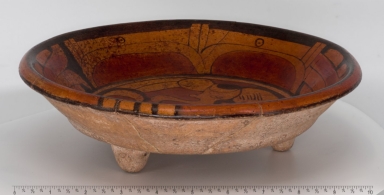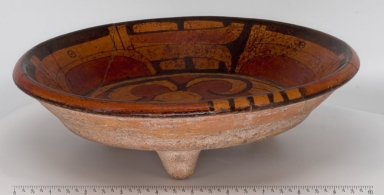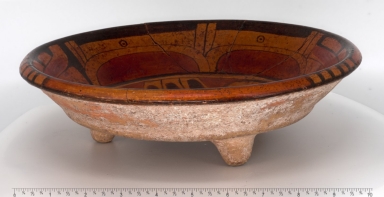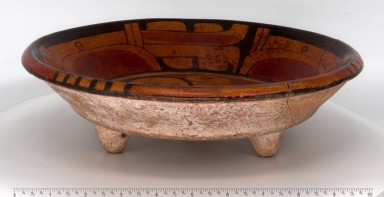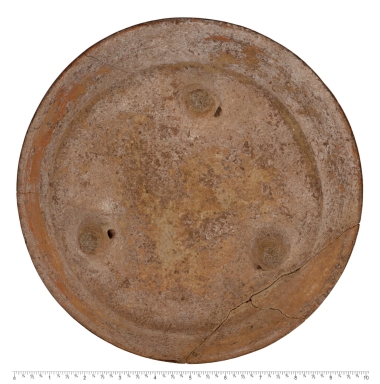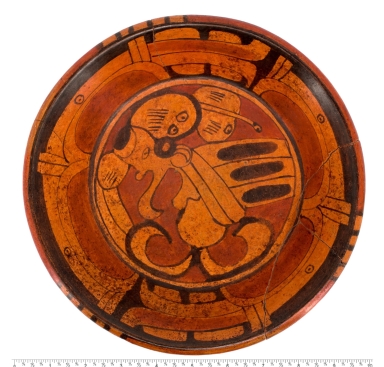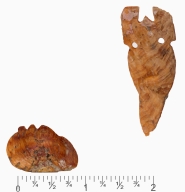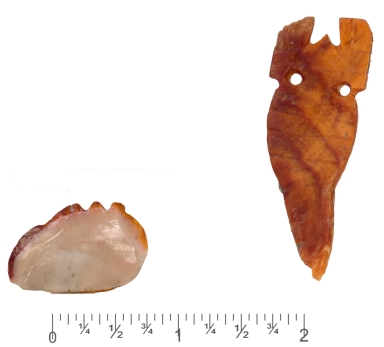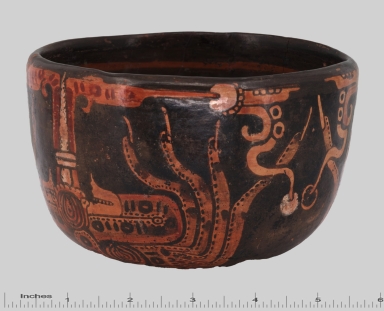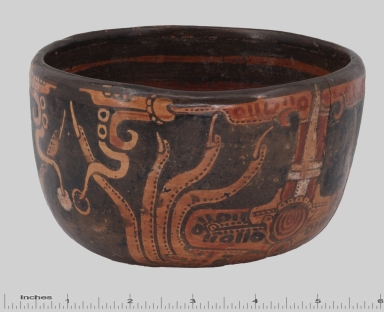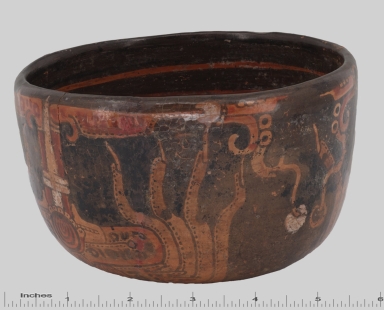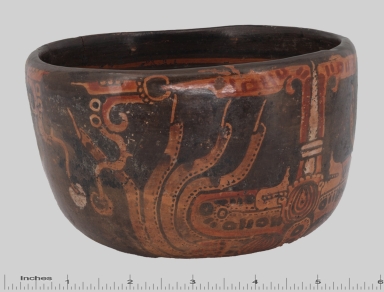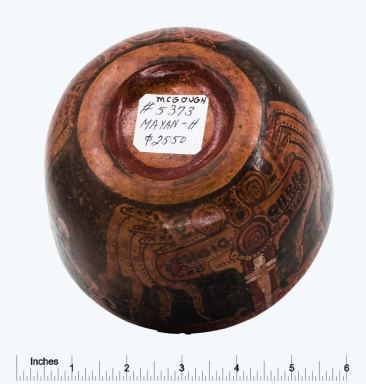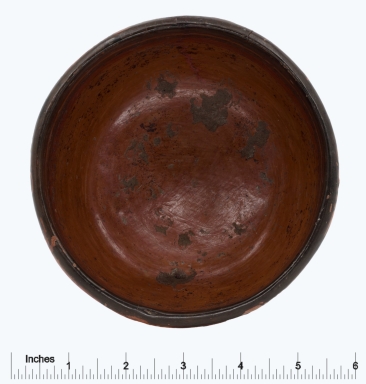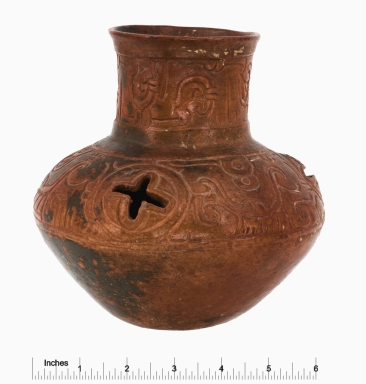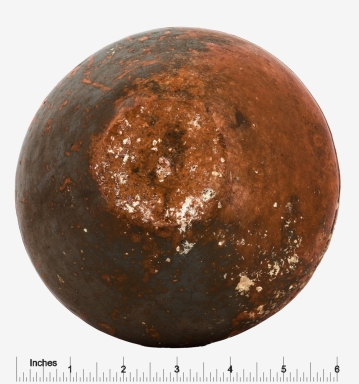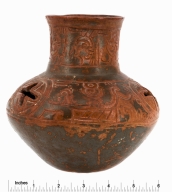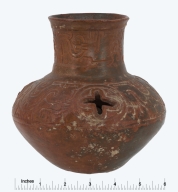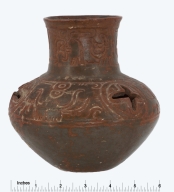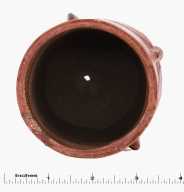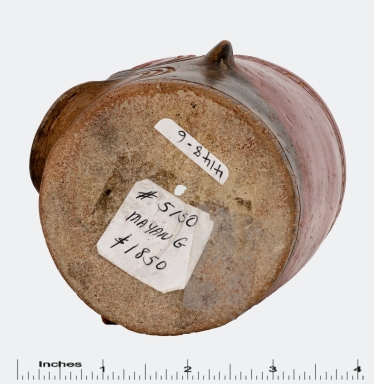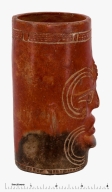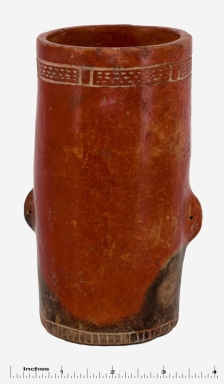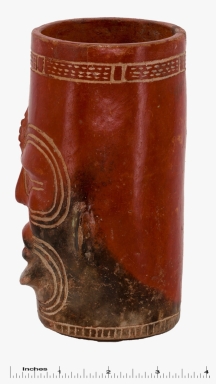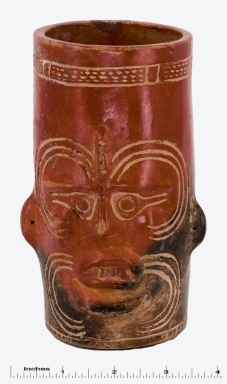|
Title
Maya copador swimmer bowl.
Description
The number three appears to have significance. It appears as three legs, three solid bands, three stepped spiral rings and two of those rings are divided into three quadrants. There are three realms in Mesoamerica: Heaven, the Sky, Earth, the living world, and the Underworld, the land of the dead.
Subject
[Ceramic bowls--Central America, Pottery--Central America, Indigenous peoples--Antiquities, Maya art--Central America, Mayas--Antiquities]
Date
between 900 and 1400
Title
Maya copador swimmer bowl.
Description
The number three appears to have significance. It appears as three legs, three solid bands, three stepped spiral rings and two of those rings are divided into three quadrants. There are three realms in Mesoamerica: Heaven, the Sky, Earth, the living world, and the Underworld, the land of the dead.
Subject
[Ceramic bowls--Central America, Pottery--Central America, Indigenous peoples--Antiquities, Maya art--Central America, Mayas--Antiquities]
Date
between 900 and 1400
Title
Maya copador swimmer bowl.
Description
The number three appears to have significance. It appears as three legs, three solid bands, three stepped spiral rings and two of those rings are divided into three quadrants. There are three realms in Mesoamerica: Heaven, the Sky, Earth, the living world, and the Underworld, the land of the dead.
Subject
[Ceramic bowls--Central America, Pottery--Central America, Indigenous peoples--Antiquities, Maya art--Central America, Mayas--Antiquities]
Date
between 900 and 1400
Title
Maya copador swimmer bowl.
Description
The number three appears to have significance. It appears as three legs, three solid bands, three stepped spiral rings and two of those rings are divided into three quadrants. There are three realms in Mesoamerica: Heaven, the Sky, Earth, the living world, and the Underworld, the land of the dead.
Subject
[Ceramic bowls--Central America, Pottery--Central America, Indigenous peoples--Antiquities, Maya art--Central America, Mayas--Antiquities]
Date
between 900 and 1400
Title
Maya copador swimmer bowl.
Description
The number three appears to have significance. It appears as three legs, three solid bands, three stepped spiral rings and two of those rings are divided into three quadrants. There are three realms in Mesoamerica: Heaven, the Sky, Earth, the living world, and the Underworld, the land of the dead.
Subject
[Ceramic bowls--Central America, Pottery--Central America, Indigenous peoples--Antiquities, Maya art--Central America, Mayas--Antiquities]
Date
between 900 and 1400
Title
Maya copador swimmer bowl.
Description
The number three appears to have significance. It appears as three legs, three solid bands, three stepped spiral rings and two of those rings are divided into three quadrants. There are three realms in Mesoamerica: Heaven, the Sky, Earth, the living world, and the Underworld, the land of the dead.
Subject
[Ceramic bowls--Central America, Pottery--Central America, Indigenous peoples--Antiquities, Maya art--Central America, Mayas--Antiquities]
Date
between 900 and 1400
Title
Standing elderly pregnant female.
Description
The elite female figure wears a puffy jaguar skin headdress with three blue quetzal feathers, a pair of earspools and a necklace. Her old and worn body as well as her jaguar paws support a very pregnant abdomen. Fertility scepters of this goddess called "Lady Rainbow" were given to women as a good maternity omen.
Subject
[Ceramic sculpture--Mexico--Jaina Island, Maya art--Mexico--Jaina Island, Mayas--Antiquities, Indigenous peoples--Antiquities, Art--Mexico--Jaina Island]
Date
between 500 and 900
Title
Standing elderly pregnant female.
Description
The elite female figure wears a puffy jaguar skin headdress with three blue quetzal feathers, a pair of earspools and a necklace. Her old and worn body as well as her jaguar paws support a very pregnant abdomen. Fertility scepters of this goddess called "Lady Rainbow" were given to women as a good maternity omen.
Subject
[Ceramic sculpture--Mexico--Jaina Island, Maya art--Mexico--Jaina Island, Mayas--Antiquities, Indigenous peoples--Antiquities, Art--Mexico--Jaina Island]
Date
between 500 and 900
Title
Standing elderly pregnant female.
Description
The elite female figure wears a puffy jaguar skin headdress with three blue quetzal feathers, a pair of earspools and a necklace. Her old and worn body as well as her jaguar paws support a very pregnant abdomen. Fertility scepters of this goddess called "Lady Rainbow" were given to women as a good maternity omen.
Subject
[Ceramic sculpture--Mexico--Jaina Island, Maya art--Mexico--Jaina Island, Mayas--Antiquities, Indigenous peoples--Antiquities, Art--Mexico--Jaina Island]
Date
between 500 and 900
Title
Standing elderly pregnant female.
Description
The elite female figure wears a puffy jaguar skin headdress with three blue quetzal feathers, a pair of earspools and a necklace. Her old and worn body as well as her jaguar paws support a very pregnant abdomen. Fertility scepters of this goddess called "Lady Rainbow" were given to women as a good maternity omen.
Subject
[Ceramic sculpture--Mexico--Jaina Island, Maya art--Mexico--Jaina Island, Mayas--Antiquities, Indigenous peoples--Antiquities, Art--Mexico--Jaina Island]
Date
between 500 and 900
Title
Standing elderly pregnant female.
Description
The elite female figure wears a puffy jaguar skin headdress with three blue quetzal feathers, a pair of earspools and a necklace. Her old and worn body as well as her jaguar paws support a very pregnant abdomen. Fertility scepters of this goddess called "Lady Rainbow" were given to women as a good maternity omen.
Subject
[Ceramic sculpture--Mexico--Jaina Island, Maya art--Mexico--Jaina Island, Mayas--Antiquities, Indigenous peoples--Antiquities, Art--Mexico--Jaina Island]
Date
between 500 and 900
Title
Standing elderly pregnant female.
Description
The elite female figure wears a puffy jaguar skin headdress with three blue quetzal feathers, a pair of earspools and a necklace. Her old and worn body as well as her jaguar paws support a very pregnant abdomen. Fertility scepters of this goddess called "Lady Rainbow" were given to women as a good maternity omen.
Subject
[Ceramic sculpture--Mexico--Jaina Island, Maya art--Mexico--Jaina Island, Mayas--Antiquities, Indigenous peoples--Antiquities, Art--Mexico--Jaina Island]
Date
between 500 and 900
Title
Maya flared bowl.
Description
This polychrome ceramic bowl was created with a flaring rim bowl. The bowl's cream slip background has been decorated with brown netted triangles, a red-brown step-fret band, and an orange geometric band.
Subject
[Pottery--El Salvador, Ceramic bowls--El Salvador, Maya art--El Salvador, Mayas--Antiquities, Indigenous peoples--Antiquities]
Date
between 600 and 800
Title
Maya flared bowl.
Description
This polychrome ceramic bowl was created with a flaring rim bowl. The bowl's cream slip background has been decorated with brown netted triangles, a red-brown step-fret band, and an orange geometric band.
Subject
[Pottery--El Salvador, Ceramic bowls--El Salvador, Maya art--El Salvador, Mayas--Antiquities, Indigenous peoples--Antiquities]
Date
between 600 and 800
Title
Maya flared bowl.
Description
This polychrome ceramic bowl was created with a flaring rim bowl. The bowl's cream slip background has been decorated with brown netted triangles, a red-brown step-fret band, and an orange geometric band.
Subject
[Pottery--El Salvador, Ceramic bowls--El Salvador, Maya art--El Salvador, Mayas--Antiquities, Indigenous peoples--Antiquities]
Date
between 600 and 800
Title
Maya flared bowl.
Description
This polychrome ceramic bowl was created with a flaring rim bowl. The bowl's cream slip background has been decorated with brown netted triangles, a red-brown step-fret band, and an orange geometric band.
Subject
[Pottery--El Salvador, Ceramic bowls--El Salvador, Maya art--El Salvador, Mayas--Antiquities, Indigenous peoples--Antiquities]
Date
between 600 and 800
Title
Maya flared bowl.
Description
This polychrome ceramic bowl was created with a flaring rim bowl. The bowl's cream slip background has been decorated with brown netted triangles, a red-brown step-fret band, and an orange geometric band.
Subject
[Pottery--El Salvador, Ceramic bowls--El Salvador, Maya art--El Salvador, Mayas--Antiquities, Indigenous peoples--Antiquities]
Date
between 600 and 800
Title
Maya flared bowl.
Description
This polychrome ceramic bowl was created with a flaring rim bowl. The bowl's cream slip background has been decorated with brown netted triangles, a red-brown step-fret band, and an orange geometric band.
Subject
[Pottery--El Salvador, Ceramic bowls--El Salvador, Maya art--El Salvador, Mayas--Antiquities, Indigenous peoples--Antiquities]
Date
between 600 and 800
Title
Codex style vessel : old God emerges from the mouth of a serpent.
Description
This codex style vessel represents a scene for the underworld, Xilbaba. An aged Maya god emerges from the mouth of the bearded dragon, Ochu Chan. Behind the old God appears the profile image of the Jeslure (sic) God, a god important to Maya nobility. In front of the old god is an offering vessel with human bones, an eyeball, and a severed hand.
Subject
[Pottery--Guatemala, Drinking vessels--Guatemala, Ceramic tableware--Guatemala, Maya art--Guatemala, Mayas--Antiquities, Indigenous peoples--Antiquities]
Date
between 550 and 850
Title
Codex style vessel : old God emerges from the mouth of a serpent.
Description
This codex style vessel represents a scene for the underworld, Xilbaba. An aged Maya god emerges from the mouth of the bearded dragon, Ochu Chan. Behind the old God appears the profile image of the Jeslure (sic) God, a god important to Maya nobility. In front of the old god is an offering vessel with human bones, an eyeball, and a severed hand.
Subject
[Pottery--Guatemala, Drinking vessels--Guatemala, Ceramic tableware--Guatemala, Maya art--Guatemala, Mayas--Antiquities, Indigenous peoples--Antiquities]
Date
between 550 and 850
Title
Codex style vessel : old God emerges from the mouth of a serpent.
Description
This codex style vessel represents a scene for the underworld, Xilbaba. An aged Maya god emerges from the mouth of the bearded dragon, Ochu Chan. Behind the old God appears the profile image of the Jeslure (sic) God, a god important to Maya nobility. In front of the old god is an offering vessel with human bones, an eyeball, and a severed hand.
Subject
[Pottery--Guatemala, Drinking vessels--Guatemala, Ceramic tableware--Guatemala, Maya art--Guatemala, Mayas--Antiquities, Indigenous peoples--Antiquities]
Date
between 550 and 850
Title
Codex style vessel : old God emerges from the mouth of a serpent.
Description
This codex style vessel represents a scene for the underworld, Xilbaba. An aged Maya god emerges from the mouth of the bearded dragon, Ochu Chan. Behind the old God appears the profile image of the Jeslure (sic) God, a god important to Maya nobility. In front of the old god is an offering vessel with human bones, an eyeball, and a severed hand.
Subject
[Pottery--Guatemala, Drinking vessels--Guatemala, Ceramic tableware--Guatemala, Maya art--Guatemala, Mayas--Antiquities, Indigenous peoples--Antiquities]
Date
between 550 and 850
Title
Codex style vessel : old God emerges from the mouth of a serpent.
Description
This codex style vessel represents a scene for the underworld, Xilbaba. An aged Maya god emerges from the mouth of the bearded dragon, Ochu Chan. Behind the old God appears the profile image of the Jeslure (sic) God, a god important to Maya nobility. In front of the old god is an offering vessel with human bones, an eyeball, and a severed hand.
Subject
[Pottery--Guatemala, Drinking vessels--Guatemala, Ceramic tableware--Guatemala, Maya art--Guatemala, Mayas--Antiquities, Indigenous peoples--Antiquities]
Date
between 550 and 850
Title
Codex style vessel : old God emerges from the mouth of a serpent.
Description
This codex style vessel represents a scene for the underworld, Xilbaba. An aged Maya god emerges from the mouth of the bearded dragon, Ochu Chan. Behind the old God appears the profile image of the Jeslure (sic) God, a god important to Maya nobility. In front of the old god is an offering vessel with human bones, an eyeball, and a severed hand.
Subject
[Pottery--Guatemala, Drinking vessels--Guatemala, Ceramic tableware--Guatemala, Maya art--Guatemala, Mayas--Antiquities, Indigenous peoples--Antiquities]
Date
between 550 and 850
Title
Shallow plate with tripodal feet : Muan bird of death image in center.
Description
The tondo of this shallow polychrome plate contains the image of the Muan bird, the bird of death from the Popol Vuh. This screech owl served Xibalba "Lords of Death" as their messenger. Two zoomorphic saurians, representing the Earth Monster in Xibalba, appear on the black shoulder of this plate.
Subject
[Plates (Tableware)--Mexico--Edzná Site, Ceramic tableware--Mexico--Edzná Site, Maya art--Mexico--Edzná Site, Mayas--Antiquities, Indigenous peoples--Antiquities]
Date
between 300 and 900
Title
Shallow plate with tripodal feet : Muan bird of death image in center.
Description
The tondo of this shallow polychrome plate contains the image of the Muan bird, the bird of death from the Popol Vuh. This screech owl served Xibalba "Lords of Death" as their messenger. Two zoomorphic saurians, representing the Earth Monster in Xibalba, appear on the black shoulder of this plate.
Subject
[Plates (Tableware)--Mexico--Edzná Site, Ceramic tableware--Mexico--Edzná Site, Maya art--Mexico--Edzná Site, Mayas--Antiquities, Indigenous peoples--Antiquities]
Date
between 300 and 900
Title
Shallow plate with tripodal feet : Muan bird of death image in center.
Description
The tondo of this shallow polychrome plate contains the image of the Muan bird, the bird of death from the Popol Vuh. This screech owl served Xibalba "Lords of Death" as their messenger. Two zoomorphic saurians, representing the Earth Monster in Xibalba, appear on the black shoulder of this plate.
Subject
[Plates (Tableware)--Mexico--Edzná Site, Ceramic tableware--Mexico--Edzná Site, Maya art--Mexico--Edzná Site, Mayas--Antiquities, Indigenous peoples--Antiquities]
Date
between 300 and 900
Title
Shallow plate with tripodal feet : Muan bird of death image in center.
Description
The tondo of this shallow polychrome plate contains the image of the Muan bird, the bird of death from the Popol Vuh. This screech owl served Xibalba "Lords of Death" as their messenger. Two zoomorphic saurians, representing the Earth Monster in Xibalba, appear on the black shoulder of this plate.
Subject
[Plates (Tableware)--Mexico--Edzná Site, Ceramic tableware--Mexico--Edzná Site, Maya art--Mexico--Edzná Site, Mayas--Antiquities, Indigenous peoples--Antiquities]
Date
between 300 and 900
Title
Shallow plate with tripodal feet : Muan bird of death image in center.
Description
The tondo of this shallow polychrome plate contains the image of the Muan bird, the bird of death from the Popol Vuh. This screech owl served Xibalba "Lords of Death" as their messenger. Two zoomorphic saurians, representing the Earth Monster in Xibalba, appear on the black shoulder of this plate.
Subject
[Plates (Tableware)--Mexico--Edzná Site, Ceramic tableware--Mexico--Edzná Site, Maya art--Mexico--Edzná Site, Mayas--Antiquities, Indigenous peoples--Antiquities]
Date
between 300 and 900
Title
Shallow plate with tripodal feet : Muan bird of death image in center.
Description
The tondo of this shallow polychrome plate contains the image of the Muan bird, the bird of death from the Popol Vuh. This screech owl served Xibalba "Lords of Death" as their messenger. Two zoomorphic saurians, representing the Earth Monster in Xibalba, appear on the black shoulder of this plate.
Subject
[Plates (Tableware)--Mexico--Edzná Site, Ceramic tableware--Mexico--Edzná Site, Maya art--Mexico--Edzná Site, Mayas--Antiquities, Indigenous peoples--Antiquities]
Date
between 300 and 900
Title
Maya spondylus shell ornaments : pendants.
Description
A Maya pendant and a scorpian pendant. Both pendants are circular.
Subject
[Pendants (Jewelry)--Central America, Decoration and ornament--Central America, Jewelry--Central America, Maya art--Central America, Mayas--Antiquities, Indigenous peoples--Antiquities]
Date
between 250 and 800
Title
Maya spondylus shell ornaments : pendants.
Description
A Maya pendant and a scorpian pendant. Both pendants are circular.
Subject
[Pendants (Jewelry)--Central America, Decoration and ornament--Central America, Jewelry--Central America, Maya art--Central America, Mayas--Antiquities, Indigenous peoples--Antiquities]
Date
between 250 and 800
Title
Polychrome bowl : zoomorphic design : anthropod, spider, or mosquito.
Description
The jointed-legged animal depicted around the bowl is an arthropod. The arthropod has eight legs, which makes it an arachnid or spider. A spider is a suitable Maya image, since it ambushes its prey. Once caught, the spider sucks out the vital life fluids of the prey.
Subject
[Pottery--Honduras, Ceramic bowls--Honduras, Ceramic tableware--Honduras, Maya art--Honduras, Mayas--Antiquities, Indigenous peoples--Antiquities]
Date
between 300 and 900
Title
Polychrome bowl : zoomorphic design : anthropod, spider, or mosquito.
Description
The jointed-legged animal depicted around the bowl is an arthropod. The arthropod has eight legs, which makes it an arachnid or spider. A spider is a suitable Maya image, since it ambushes its prey. Once caught, the spider sucks out the vital life fluids of the prey.
Subject
[Pottery--Honduras, Ceramic bowls--Honduras, Ceramic tableware--Honduras, Maya art--Honduras, Mayas--Antiquities, Indigenous peoples--Antiquities]
Date
between 300 and 900
Title
Polychrome bowl : zoomorphic design : anthropod, spider, or mosquito.
Description
The jointed-legged animal depicted around the bowl is an arthropod. The arthropod has eight legs, which makes it an arachnid or spider. A spider is a suitable Maya image, since it ambushes its prey. Once caught, the spider sucks out the vital life fluids of the prey.
Subject
[Pottery--Honduras, Ceramic bowls--Honduras, Ceramic tableware--Honduras, Maya art--Honduras, Mayas--Antiquities, Indigenous peoples--Antiquities]
Date
between 300 and 900
Title
Polychrome bowl : zoomorphic design : anthropod, spider, or mosquito.
Description
The jointed-legged animal depicted around the bowl is an arthropod. The arthropod has eight legs, which makes it an arachnid or spider. A spider is a suitable Maya image, since it ambushes its prey. Once caught, the spider sucks out the vital life fluids of the prey.
Subject
[Pottery--Honduras, Ceramic bowls--Honduras, Ceramic tableware--Honduras, Maya art--Honduras, Mayas--Antiquities, Indigenous peoples--Antiquities]
Date
between 300 and 900
Title
Polychrome bowl : zoomorphic design : anthropod, spider, or mosquito.
Description
The jointed-legged animal depicted around the bowl is an arthropod. The arthropod has eight legs, which makes it an arachnid or spider. A spider is a suitable Maya image, since it ambushes its prey. Once caught, the spider sucks out the vital life fluids of the prey.
Subject
[Pottery--Honduras, Ceramic bowls--Honduras, Ceramic tableware--Honduras, Maya art--Honduras, Mayas--Antiquities, Indigenous peoples--Antiquities]
Date
between 300 and 900
Title
Polychrome bowl : zoomorphic design : anthropod, spider, or mosquito.
Description
The jointed-legged animal depicted around the bowl is an arthropod. The arthropod has eight legs, which makes it an arachnid or spider. A spider is a suitable Maya image, since it ambushes its prey. Once caught, the spider sucks out the vital life fluids of the prey.
Subject
[Pottery--Honduras, Ceramic bowls--Honduras, Ceramic tableware--Honduras, Maya art--Honduras, Mayas--Antiquities, Indigenous peoples--Antiquities]
Date
between 300 and 900
Title
Maya plumbate olla : rattle.
Description
This unusual plumbate cacao vessel is divided into three quadrants. Each quadrant contains an elaborate design of semi-abstract faces and zoomorphic (supernatural entities) on the vessel's neckband and wide shoulder band. Between each quadrant, the Maya "kin" crosses hold a ceramic sphere to create a rattling sound.
Subject
[Pottery--Mexico--Chiapas, Ceramic tableware--Mexico--Chiapas, Drinking vessels--Mexico--Chiapas, Maya art--Mexico--Chiapas, Mayas--Antiquities, Indigenous peoples--Antiquities]
Date
between 900 and 1250
Title
Maya plumbate olla : rattle.
Description
This unusual plumbate cacao vessel is divided into three quadrants. Each quadrant contains an elaborate design of semi-abstract faces and zoomorphic (supernatural entities) on the vessel's neckband and wide shoulder band. Between each quadrant, the Maya "kin" crosses hold a ceramic sphere to create a rattling sound.
Subject
[Pottery--Mexico--Chiapas, Ceramic tableware--Mexico--Chiapas, Drinking vessels--Mexico--Chiapas, Maya art--Mexico--Chiapas, Mayas--Antiquities, Indigenous peoples--Antiquities]
Date
between 900 and 1250
Title
Maya plumbate olla : rattle.
Description
This unusual plumbate cacao vessel is divided into three quadrants. Each quadrant contains an elaborate design of semi-abstract faces and zoomorphic (supernatural entities) on the vessel's neckband and wide shoulder band. Between each quadrant, the Maya "kin" crosses hold a ceramic sphere to create a rattling sound.
Subject
[Pottery--Mexico--Chiapas, Ceramic tableware--Mexico--Chiapas, Drinking vessels--Mexico--Chiapas, Maya art--Mexico--Chiapas, Mayas--Antiquities, Indigenous peoples--Antiquities]
Date
between 900 and 1250
Title
Maya plumbate olla : rattle.
Description
This unusual plumbate cacao vessel is divided into three quadrants. Each quadrant contains an elaborate design of semi-abstract faces and zoomorphic (supernatural entities) on the vessel's neckband and wide shoulder band. Between each quadrant, the Maya "kin" crosses hold a ceramic sphere to create a rattling sound.
Subject
[Pottery--Mexico--Chiapas, Ceramic tableware--Mexico--Chiapas, Drinking vessels--Mexico--Chiapas, Maya art--Mexico--Chiapas, Mayas--Antiquities, Indigenous peoples--Antiquities]
Date
between 900 and 1250
Title
Maya plumbate olla : rattle.
Description
This unusual plumbate cacao vessel is divided into three quadrants. Each quadrant contains an elaborate design of semi-abstract faces and zoomorphic (supernatural entities) on the vessel's neckband and wide shoulder band. Between each quadrant, the Maya "kin" crosses hold a ceramic sphere to create a rattling sound.
Subject
[Pottery--Mexico--Chiapas, Ceramic tableware--Mexico--Chiapas, Drinking vessels--Mexico--Chiapas, Maya art--Mexico--Chiapas, Mayas--Antiquities, Indigenous peoples--Antiquities]
Date
between 900 and 1250
Title
Maya plumbate olla : rattle.
Description
This unusual plumbate cacao vessel is divided into three quadrants. Each quadrant contains an elaborate design of semi-abstract faces and zoomorphic (supernatural entities) on the vessel's neckband and wide shoulder band. Between each quadrant, the Maya "kin" crosses hold a ceramic sphere to create a rattling sound.
Subject
[Pottery--Mexico--Chiapas, Ceramic tableware--Mexico--Chiapas, Drinking vessels--Mexico--Chiapas, Maya art--Mexico--Chiapas, Mayas--Antiquities, Indigenous peoples--Antiquities]
Date
between 900 and 1250
Title
Orangeware effigy vessel : deity Simian.
Description
A small appliqued cylinder with an anthropomorphic face and a fanged mouth, whiskers incised on the brow, and around the fanged mouth suggests a deity.
Subject
[Effigy pottery--Central America, Ceramic tableware--Central America, Drinking vessels--Central America, Maya art--Central America, Mayas--Antiquities, Indigenous peoples--Antiquities]
Date
between 500 and 800
Title
Orangeware effigy vessel : deity Simian.
Description
A small appliqued cylinder with an anthropomorphic face and a fanged mouth, whiskers incised on the brow, and around the fanged mouth suggests a deity.
Subject
[Effigy pottery--Central America, Ceramic tableware--Central America, Drinking vessels--Central America, Maya art--Central America, Mayas--Antiquities, Indigenous peoples--Antiquities]
Date
between 500 and 800
Title
Orangeware effigy vessel : deity Simian.
Description
A small appliqued cylinder with an anthropomorphic face and a fanged mouth, whiskers incised on the brow, and around the fanged mouth suggests a deity.
Subject
[Effigy pottery--Central America, Ceramic tableware--Central America, Drinking vessels--Central America, Maya art--Central America, Mayas--Antiquities, Indigenous peoples--Antiquities]
Date
between 500 and 800
Title
Orangeware effigy vessel : deity Simian.
Description
A small appliqued cylinder with an anthropomorphic face and a fanged mouth, whiskers incised on the brow, and around the fanged mouth suggests a deity.
Subject
[Effigy pottery--Central America, Ceramic tableware--Central America, Drinking vessels--Central America, Maya art--Central America, Mayas--Antiquities, Indigenous peoples--Antiquities]
Date
between 500 and 800
Title
Orangeware effigy vessel : deity Simian.
Description
A small appliqued cylinder with an anthropomorphic face and a fanged mouth, whiskers incised on the brow, and around the fanged mouth suggests a deity.
Subject
[Effigy pottery--Central America, Ceramic tableware--Central America, Drinking vessels--Central America, Maya art--Central America, Mayas--Antiquities, Indigenous peoples--Antiquities]
Date
between 500 and 800
Title
Orangeware effigy vessel : deity Simian.
Description
A small appliqued cylinder with an anthropomorphic face and a fanged mouth, whiskers incised on the brow, and around the fanged mouth suggests a deity.
Subject
[Effigy pottery--Central America, Ceramic tableware--Central America, Drinking vessels--Central America, Maya art--Central America, Mayas--Antiquities, Indigenous peoples--Antiquities]
Date
between 500 and 800
|
